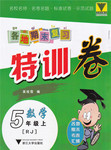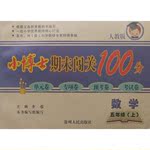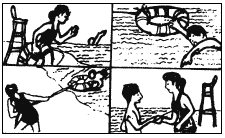
Miss Johnson is a friend of_______. .
|
A.Mary’s mother |
B.Mary’s mothers’ |
|
C.Mary mother’s |
D.Mary’s mother’s |
 各地期末复习特训卷系列答案
各地期末复习特训卷系列答案 小博士期末闯关100分系列答案
小博士期末闯关100分系列答案科目:高中英语 来源:黄冈中学作业本高二英语(上册) 题型:056
书面表达
看下面四幅图画,了解故事发生的时间、地点、人物、情节。然后,根据图画所示的顺序,写一篇英文报道,内容包括:
1.7月8日下午7:00左右,Johns Beach处救生员(lifeguard)Miss Rose突然听到了什么?
2.孩子发生了什么事?危急时刻,他抓住了什么?
3.小孩如何得救?
4.小孩和Miss Rose此刻心情如何,相互说了什么?(请自己想像)
要求:1.不要遗漏要点。
2.字数:100词左右。

查看答案和解析>>
科目:高中英语 来源: 题型:阅读理解
NOT all math skills are learned in the classroom. Some of them come naturally. Consider the split-second calculations you make when you estimate (估计) the number of empty seats on the school bus or the number of cookies in a cookie jar.
These estimates can often be done without counting. That's because humans are born with the ability to closely guess the number of items in a group. Researchers call this ability a person's "number sense".
To see how a person's inborn number sense might be linked to mathematical performance in the classroom, psychologist Justin Halberda and his colleagues from Johns Hopkins University in
The scientists asked 64 14-year-olds to look at images (影像) of yellow and blue dots that flashed on a computer screen for a fraction (一小部分) of a second. Each image contained between 10 and 32 dots that varied in size.
Some images contained twice as many blue dots as yellow dots. In other images, however, the number of blue and yellow dots was nearly equal. For each image, the students were asked to estimate which color had more dots.
The scientists found a wide variation in how well students could pick the color with the most dots.
The scientists then looked at the students' math scores dating back to kindergarten. Children that performed best in the image test also scored the highest in standard math tests.
The same finding held true at the other end of the spectrum (范围). Students who didn't score well on the image test received lower math scores.
The study was the first to show a link between a person's inborn number sense and his or her achievement in formal math training.
Does this connection mean that one cannot be good in math if they have a weak number sense? Or that having a strong number sense is a guarantee for good grades in math? The answers are not clear.
While scientists continue looking at the possible links between a person's number sense and math achievement, one thing is certain: Doing lots of math homework will boost your chances of success.
56. Which of the following is not true according to the passage?
A. Everyone has an inborn number sense.
B. Those who have a strong number sense are sure to do well in math.
C. Some of the math skills are inborn.
D. Doing a lot of math exercises may help to learn math well.
57. Justin Halberda and his colleagues ran some tests to .
A. look at the students' math scores dating back to kindergarten.
B. ask the students to estimate the dots
C. see if a person's inborn number sense has something to do with math learning
D. decide how to learn math well
58. What is the proper meaning of the underlined word "boost"?
A. increase B. grasp
C. miss D. possess
59. According to the passage, the most important thing to learn math well is that .
A. one should have an inborn number sense
B. one should practice a lot
C. one should do a lot of tests
D. one should do a lot of counting
60. What is the result of Justin Halberda's tests?
A. Students who did well in the tests also did well in math exams.
B. One cannot be successful in math if he has a well number sense.
C. One who has a strong number sense can not do math well.
D. One should do a lot of math homework if he wants to have a number sense.
查看答案和解析>>
科目:高中英语 来源: 题型:阅读理解
Not all math skills are learned in the classroom.Some of them come naturally.Consider the split-second calculations you make when you estimate(估计)the number of empty seats on the school bus or the number of cookies in a cookie jar.
These estimates can often be done without counting.That's because humans are born with the ability to closely guess the number of items in a group.Researchers call this ability a person's "number sense".
To see how a person's inborn number sense might be linked to mathematical performance in the classroom, psychologist Justin Halberda and his colleagues from Johns Hopkins University in Baltimore, US ran some tests.
The scientists asked 64 14-year-olds to look at images of yellow and blue dots that flashed on a computer screen for a fraction (一小部分) of a second.Each image contained between 10 and 32 dots that varied in size.
Some images contained twice as many blue dots as yellow dots.In other images, however, the number of blue and yellow dots was nearly equal.For each image, the students were asked to estimate which color had more dots.
The scientists found a wide variation in how well students could pick the color with the most dots.
The scientists then looked at the students' math scores dating back to kindergarten.Children that performed best in the image test also scored the highest in standard math tests.The same finding held true at the other end of the spectrum (范围).Students who didn't score well on the image test received lower math scores.
The study was the first to show a link between a person's inborn number sense and his or her achievement in formal math training.
Does this connection mean that one cannot be good in math if they have a weak number sense? Or that having a strong number sense is a guarantee for good grades in math? The answers are not clear.
While scientists continue looking at the possible links between a person's number sense and math achievement, one thing is certain: Doing lots of math homework will boost your chances of success.
1.Justin Halberda and his colleagues ran some tests to .
A.look at the students' math scores dating back to kindergarten.
B.ask the students to estimate the dots
C.see if a person's inborn number sense has something to do with math learning
D.decide how to learn math well
2.What is the proper meaning of the underlined word "boost"?
A.increase B.grasp C.miss D.possess
3.According to the passage, the most important thing to learn math well is that .
A.one should have an inborn number sense
B.one should practice a lot
C.one should do a lot of tests
D.one should do a lot of counting
4.What is the result of Justin Halberda's tests?
A.Students who did well in the tests also did well in math exams.
B.One cannot be successful in math if he has a well number sense.
C.One who has a strong number sense can not do math well.
D.One should do a lot of math homework if he wants to have a number sense.
查看答案和解析>>
湖北省互联网违法和不良信息举报平台 | 网上有害信息举报专区 | 电信诈骗举报专区 | 涉历史虚无主义有害信息举报专区 | 涉企侵权举报专区
违法和不良信息举报电话:027-86699610 举报邮箱:58377363@163.com